John Wycliffe - Trinitarian Bible Society
John Wycliffe - Trinitarian Bible Society
John Wycliffe - Trinitarian Bible Society
You also want an ePaper? Increase the reach of your titles
YUMPU automatically turns print PDFs into web optimized ePapers that Google loves.
<strong>Trinitarian</strong> <strong>Bible</strong> <strong>Society</strong> – Quarterly Record<br />
Issue Number: 565 – October to December<br />
“...in the end the truth will conquer”<br />
All of this directed attention towards<br />
<strong>Wycliffe</strong>’s teaching in its wider implications –<br />
Scripture alone the fountain of truth and<br />
foundation of authority, and anything not<br />
framed by such a measure was not to be<br />
imposed nor obeyed, whether in things<br />
temporal or in things spiritual. 12 <strong>Wycliffe</strong>’s<br />
career in the political limelight was over. <strong>John</strong><br />
of Gaunt’s influence was temporarily<br />
diminished, and he (Gaunt) was also<br />
becoming a little wary of the more religious<br />
aspects of <strong>Wycliffe</strong>’s teaching. Preaching,<br />
teaching, and translation work would occupy<br />
<strong>Wycliffe</strong>, living at Lutterworth, for the last<br />
seven years of his life.<br />
‘Ex Cathedra’,<br />
or, How many Popes can<br />
sit on one Chair?<br />
In 1378 an event came to pass which<br />
stunned and horrified the Western<br />
World. When Gregory XI died, Clement<br />
VII was elected Pope. Rome’s inhabitants<br />
demanded an Italian as the Bishop of Rome,<br />
and thus Pope, and the unthinkable was<br />
accomplished. French Clement was obliged to<br />
set up his ‘court’ as Pope in Avignon, whilst<br />
Italian Urban VI ruled as Pope in Rome. The<br />
infamous ‘Papal Schism’ had occurred. This<br />
beginning of the Great Schism came when<br />
<strong>Wycliffe</strong> was coming to maturity in his<br />
realisation of the wrongs of the Papacy, and<br />
when he had more time away from the<br />
political arena.<br />
In 1378 <strong>Wycliffe</strong> issued a tract On the<br />
schism of the Popes; in 1381 he issued<br />
Twelve theses against transubstantiation<br />
and in 1382 Objections to Friars. In<br />
addressing these issues – the papacy, the<br />
mass and the monks – in their corruptions<br />
and in their lack of Biblical warrant or<br />
foundation, <strong>Wycliffe</strong> laid the axe to roots of<br />
the tree. It was an axe which many<br />
subsequently would wield mightily, even at<br />
the hazard of their lives, and turn the world<br />
upside down once again, in the footsteps of<br />
the Apostles. To <strong>John</strong> <strong>Wycliffe</strong>, scholar, these<br />
doctrines, parading in the garb of Christian<br />
Truth, were relative novelties.<br />
Transubstantiation as the grossly externalised<br />
means of Communion with Christ, was<br />
proclaimed by Pope Innocent III in 1215, as<br />
was the procedure of confession of sins to a<br />
priest. The universal supremacy of the<br />
papacy was promulgated by Pope Boniface<br />
VIII in 1302. 13 As for the monks – the<br />
vileness and violence of so much involved<br />
with them was such that some respectable<br />
families declined to have their children<br />
educated formally, because it would expose<br />
them to the predatory appetites of their<br />
monk-teachers.<br />
Having crossed this Rubicon, <strong>Wycliffe</strong><br />
never let up in his march on Rome, and most<br />
of all opposed that grotesque view, according<br />
to which any priest was in a position to<br />
‘create’ the body of Christ. He resolutely<br />
denounced, as contrary to Scripture, the<br />
teaching that after the consecration the bread<br />
and the wine are changed into Christ’s body<br />
and blood.<br />
<strong>Wycliffe</strong>’s perception of the church was<br />
implicitly revolutionary and anticipatory of the<br />
sixteenth century Reformation. Driven by the<br />
calamitous failure of the medieval church in<br />
the political arena, he began to see the<br />
church as a spiritual institution and not a<br />
political one. He left as a magnificent heritage<br />
the principle that the visible church, in all its<br />
parts, powers and persons, is ever subject to<br />
evaluation in the light of Scripture only. Even<br />
if there should be a hundred popes, let alone<br />
two, they must come to the court of Scripture<br />
to be adjudged as to their right and worth.<br />
The Truth of<br />
Scripture and The<br />
Lollard <strong>Bible</strong><br />
The mainspring of <strong>Wycliffe</strong>’s mature<br />
work was that the Scriptures are the<br />
foundation of all doctrine. This was the<br />
crux of the matter, the cardinal hinge. His<br />
1378 work De veritate Sacrae Scripturae<br />
(On the Truth of Sacred Scripture)<br />
describes the <strong>Bible</strong> as being directly from God<br />
Himself, timeless, unchanging, free from<br />
error and contradictions, containing only<br />
truth, accepting no addition, suffering no<br />
subtraction. All must be taken equally,<br />
absolutely, without qualification. 14 Scripture is<br />
the law of Christ, the Truth, and must be<br />
placed above all human writings. Men ought<br />
to learn the law of Christ, because the faith<br />
rests in it alone. Without knowledge of the<br />
<strong>Bible</strong> there can be no peace, no real and<br />
abiding good; it contains all that is necessary<br />
for the salvation of men. It alone is infallible,<br />
and therefore is the one authority for the<br />
faith. As a true Christian will be one who finds<br />
his faith in the light of Scripture, so a true<br />
Shepherd of Christians will be one who feeds<br />
his flock on the Word of God. A hundred<br />
years before Luther or Tyndale was born,<br />
<strong>Wycliffe</strong> was comprehensively persuaded of<br />
the importance of Scripture.<br />
For <strong>Wycliffe</strong>, as later for Luther and<br />
Tyndale, the next step was inevitable. The<br />
<strong>Bible</strong> must be available for the people in their<br />
mother tongue. Roman apologists are quick<br />
to point out that there were portions of<br />
Scripture in many of the European languages;<br />
but they were not generally accessible. Whilst<br />
the Council of Nicea in 325 had been of the<br />
opinion that no Christian should be without<br />
the Scriptures, the Council of Toulouse in<br />
1229 was of a different mind. Trying to deal<br />
Some English Scriptures<br />
Before <strong>Wycliffe</strong><br />
7th c. Caedmon’s Metrical Paraphrases<br />
8th c. Aldhelm’s Psalter<br />
Bede’s Gospel of <strong>John</strong><br />
9th c. Alfred – Ten Commandments,<br />
Lord’s Prayer and Psalter<br />
10th c. Aldred’s Gospels;<br />
Faerman’s Matthew<br />
(the Rushworth Gloss)<br />
11th c. Aelfric’s paraphrases<br />
12th c. The Ormulun: a Saxon outline of<br />
the Gospels and Acts<br />
13th c. Rolle’s ‘Sowlehele’: a metrical<br />
synopsis of <strong>Bible</strong> events.<br />
with the ‘problem’ of the Albigenses, canon<br />
14 of their deliberations reads:-<br />
We prohibit also that the laity should<br />
be permitted to have the books of the<br />
Old or New Testament; unless anyone<br />
from motive of devotion should wish<br />
to have the Psalter or the Breviary for<br />
divine offices or the hours of the<br />
blessed Virgin; but we most strictly<br />
forbid their having any translation of<br />
these books. 15<br />
Such Scripture portions as did exist in the<br />
vernacular tongues were rather a ‘private’<br />
resource for the ‘religious’ or ‘spiritual’ than<br />
the ‘Word of God among all nations’. <strong>Wycliffe</strong><br />
did not simply want circulation to the learned<br />
or spiritually experienced; he was of the same<br />
mind as Tyndale 150 years later, that the<br />
Scriptures should widely be published<br />
abroad, accessible, that men might know not<br />
only the Truth of the Gospel, but also the<br />
errors of the supposed guides to God. He set<br />
himself to the task.<br />
24<br />
25


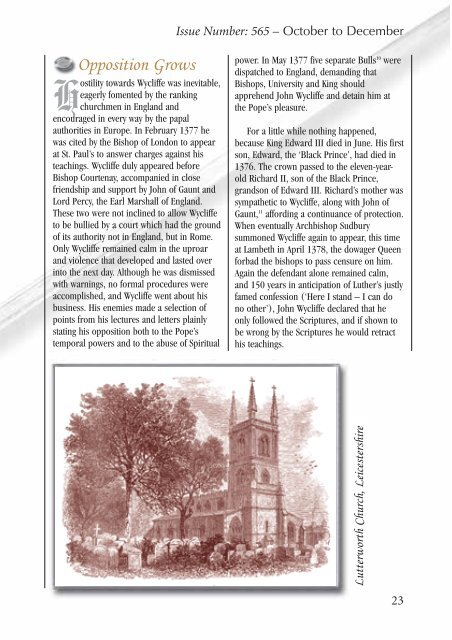
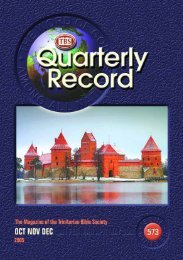
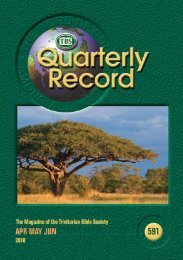
![The Love of the Truth [pdf] - Trinitarian Bible Society](https://img.yumpu.com/49788277/1/184x260/the-love-of-the-truth-pdf-trinitarian-bible-society.jpg?quality=85)
![Bible Word List and Reading Plan [pdf] - Trinitarian Bible Society](https://img.yumpu.com/46882563/1/177x260/bible-word-list-and-reading-plan-pdf-trinitarian-bible-society.jpg?quality=85)
![Click to Download Document [pdf] - Trinitarian Bible Society](https://img.yumpu.com/44904205/1/184x260/click-to-download-document-pdf-trinitarian-bible-society.jpg?quality=85)
![Download Document [pdf] - Trinitarian Bible Society](https://img.yumpu.com/44584740/1/184x260/download-document-pdf-trinitarian-bible-society.jpg?quality=85)
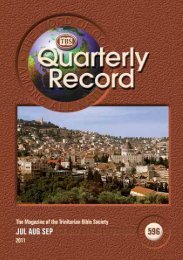
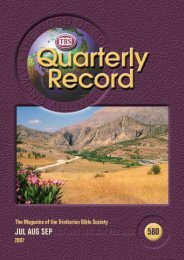
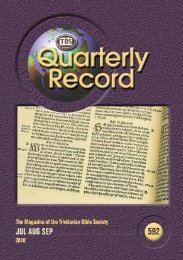
![Download Document [pdf] - Trinitarian Bible Society](https://img.yumpu.com/41007786/1/184x260/download-document-pdf-trinitarian-bible-society.jpg?quality=85)
![Click to Download Document [pdf] - Trinitarian Bible Society](https://img.yumpu.com/40894484/1/188x260/click-to-download-document-pdf-trinitarian-bible-society.jpg?quality=85)
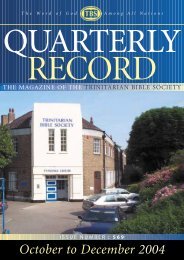
![Download Document [pdf] - Trinitarian Bible Society](https://img.yumpu.com/39425868/1/184x260/download-document-pdf-trinitarian-bible-society.jpg?quality=85)
![Download Document [pdf] - Trinitarian Bible Society](https://img.yumpu.com/39425821/1/184x260/download-document-pdf-trinitarian-bible-society.jpg?quality=85)